2014.07.DD - Classic Rock - The Year Of Living Dangerously (The Story Of GN'R Lies)
Page 1 of 1
 2014.07.DD - Classic Rock - The Year Of Living Dangerously (The Story Of GN'R Lies)
2014.07.DD - Classic Rock - The Year Of Living Dangerously (The Story Of GN'R Lies)
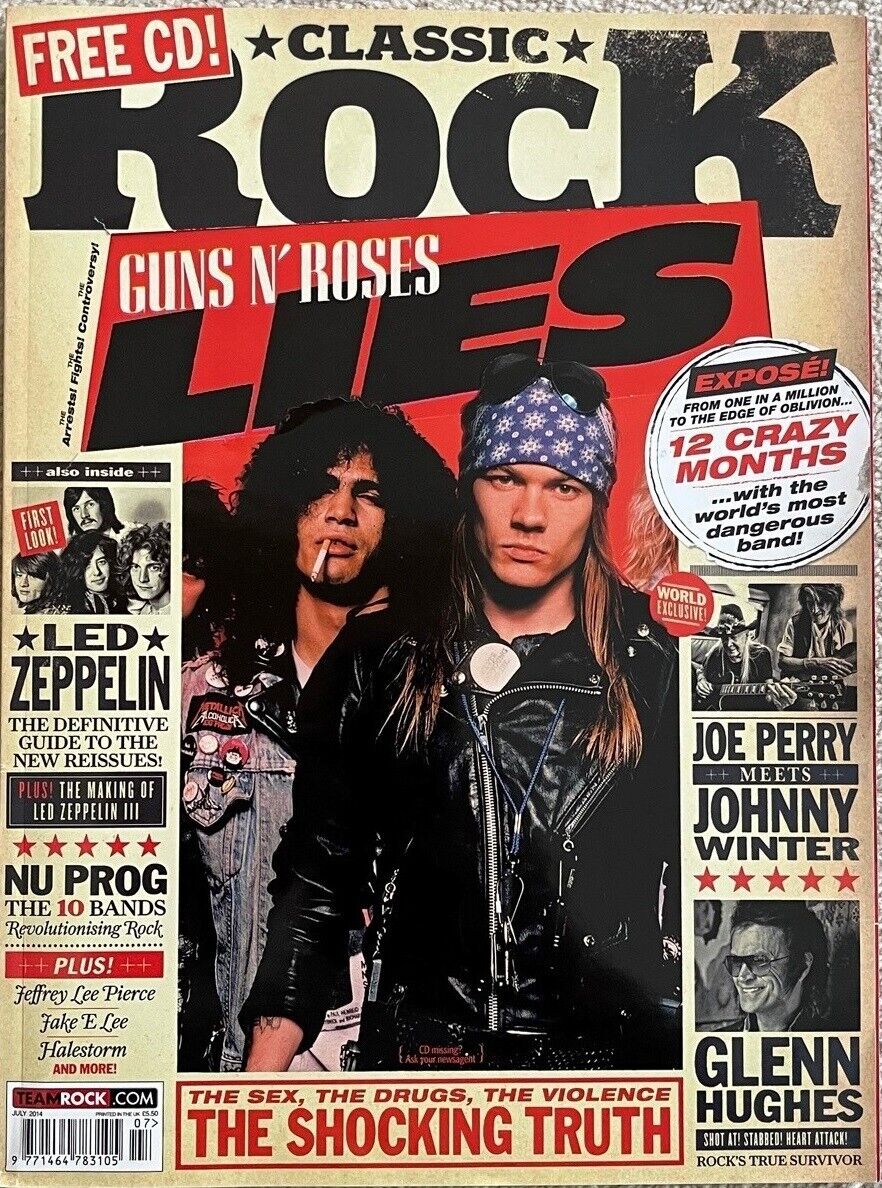
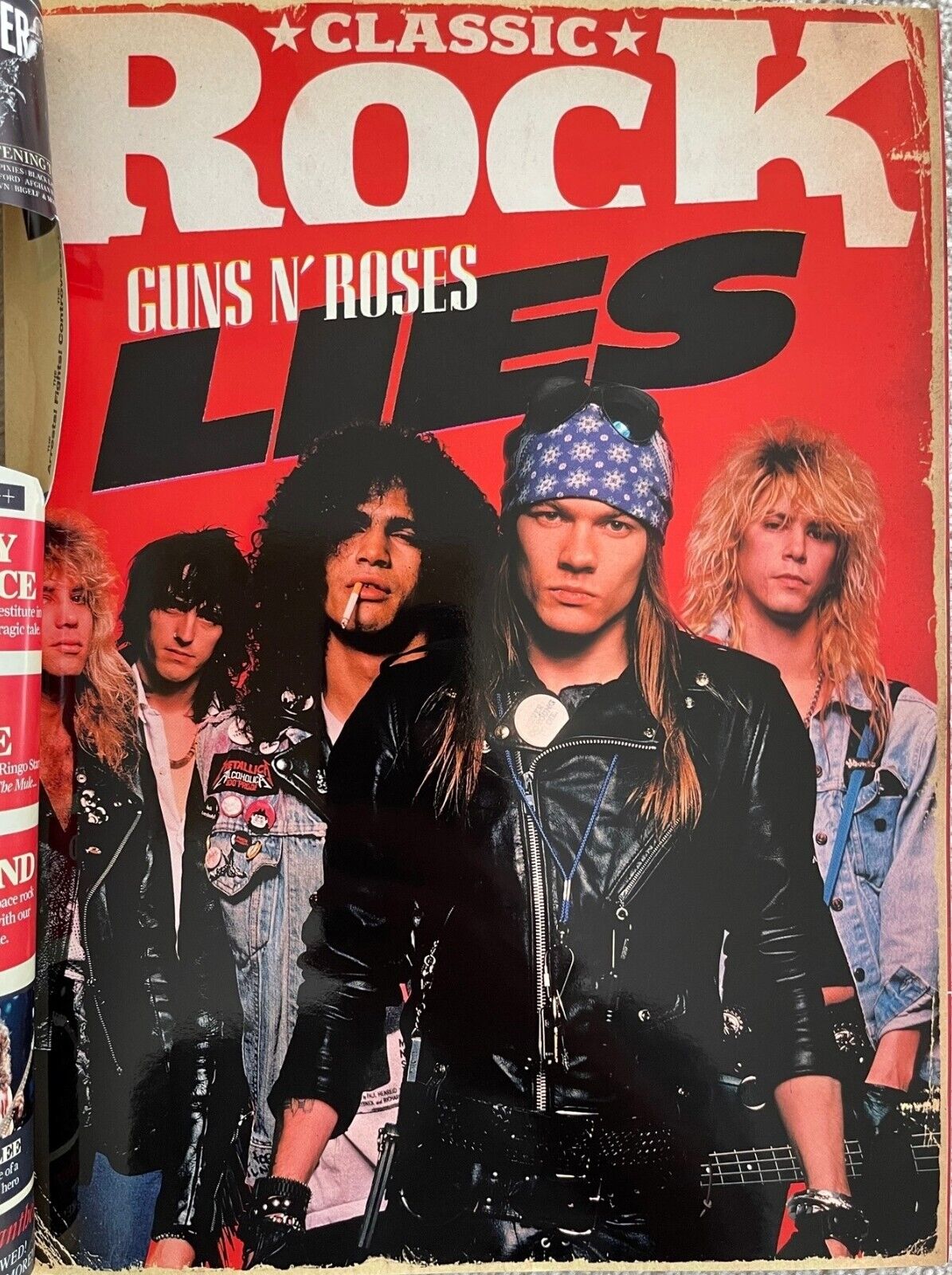
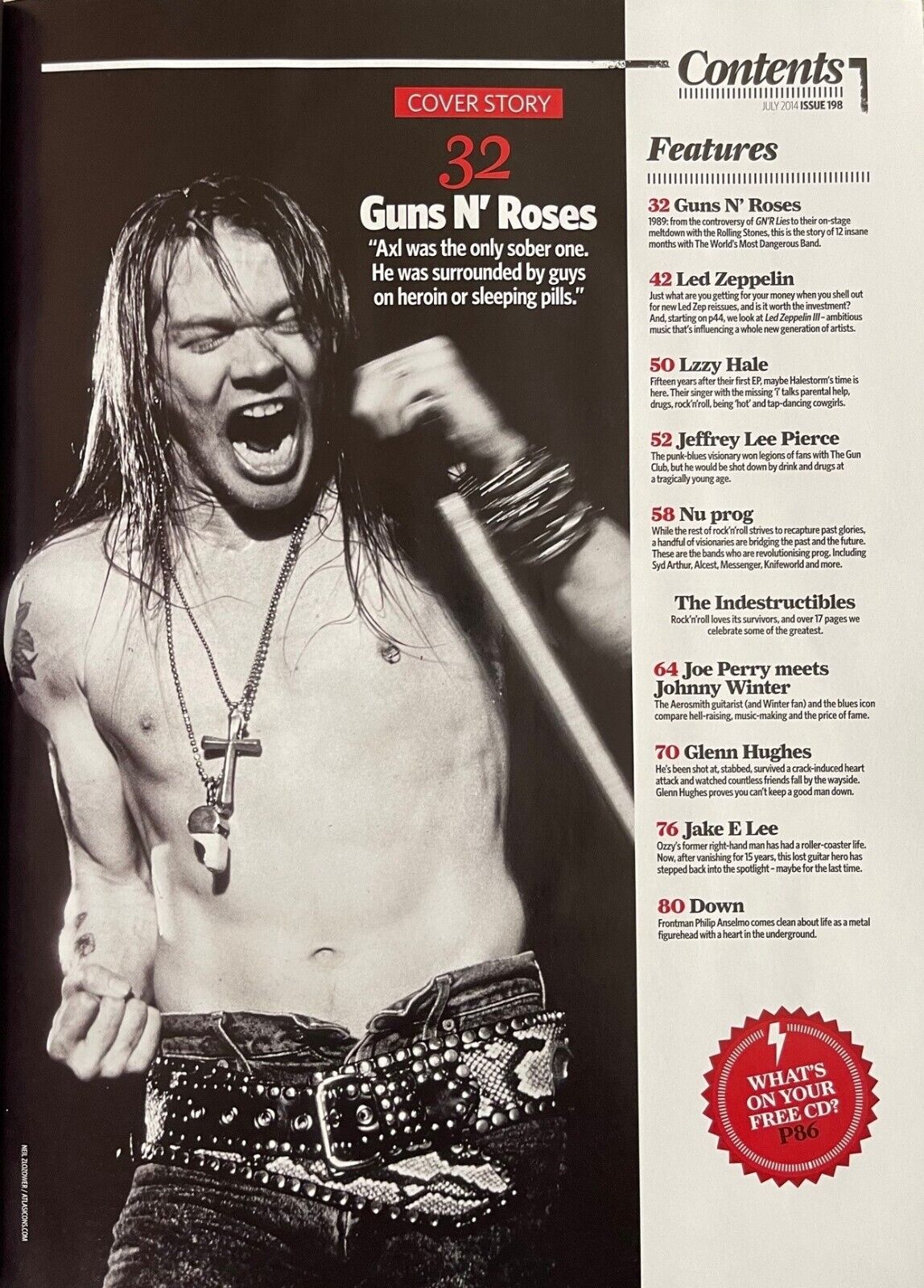
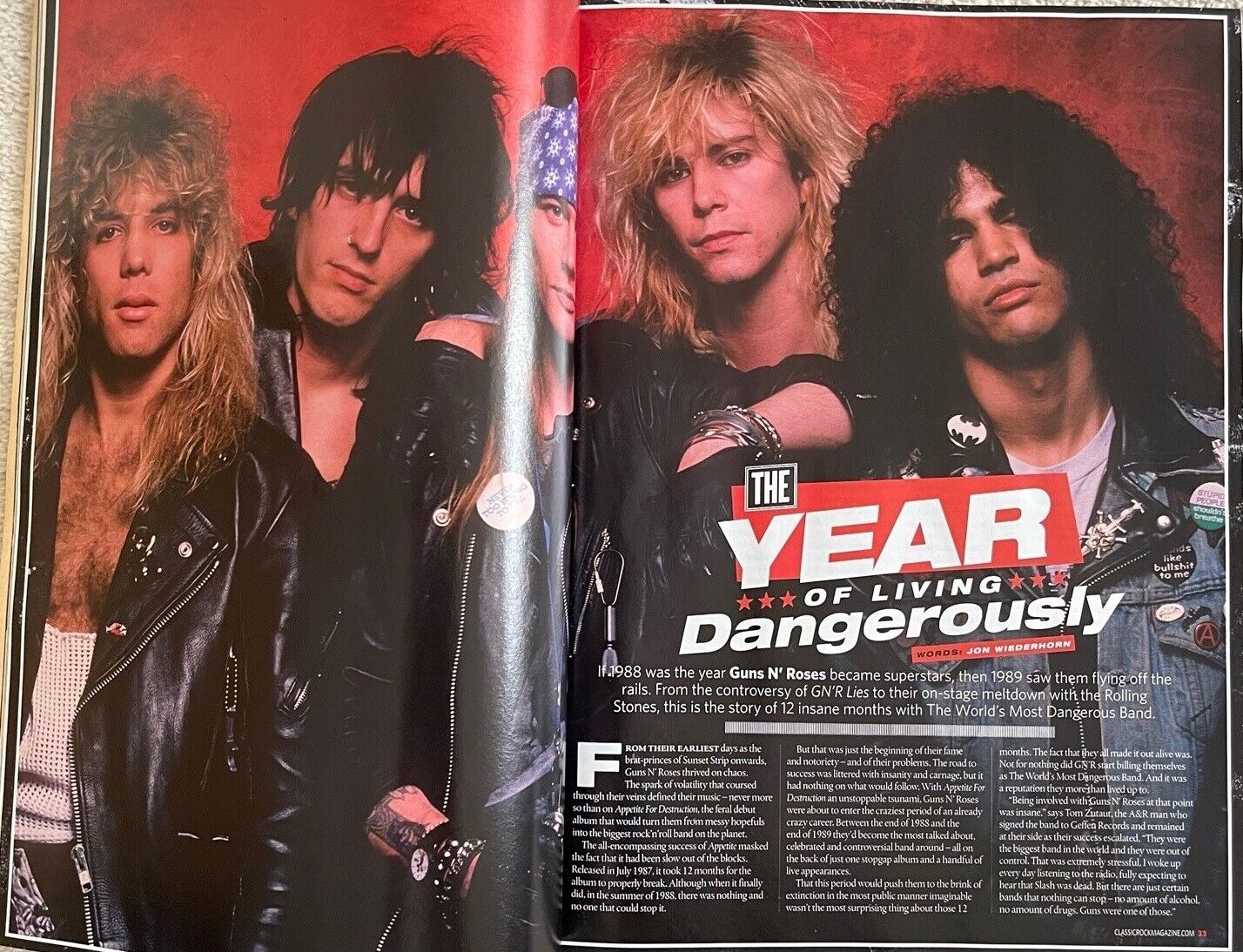
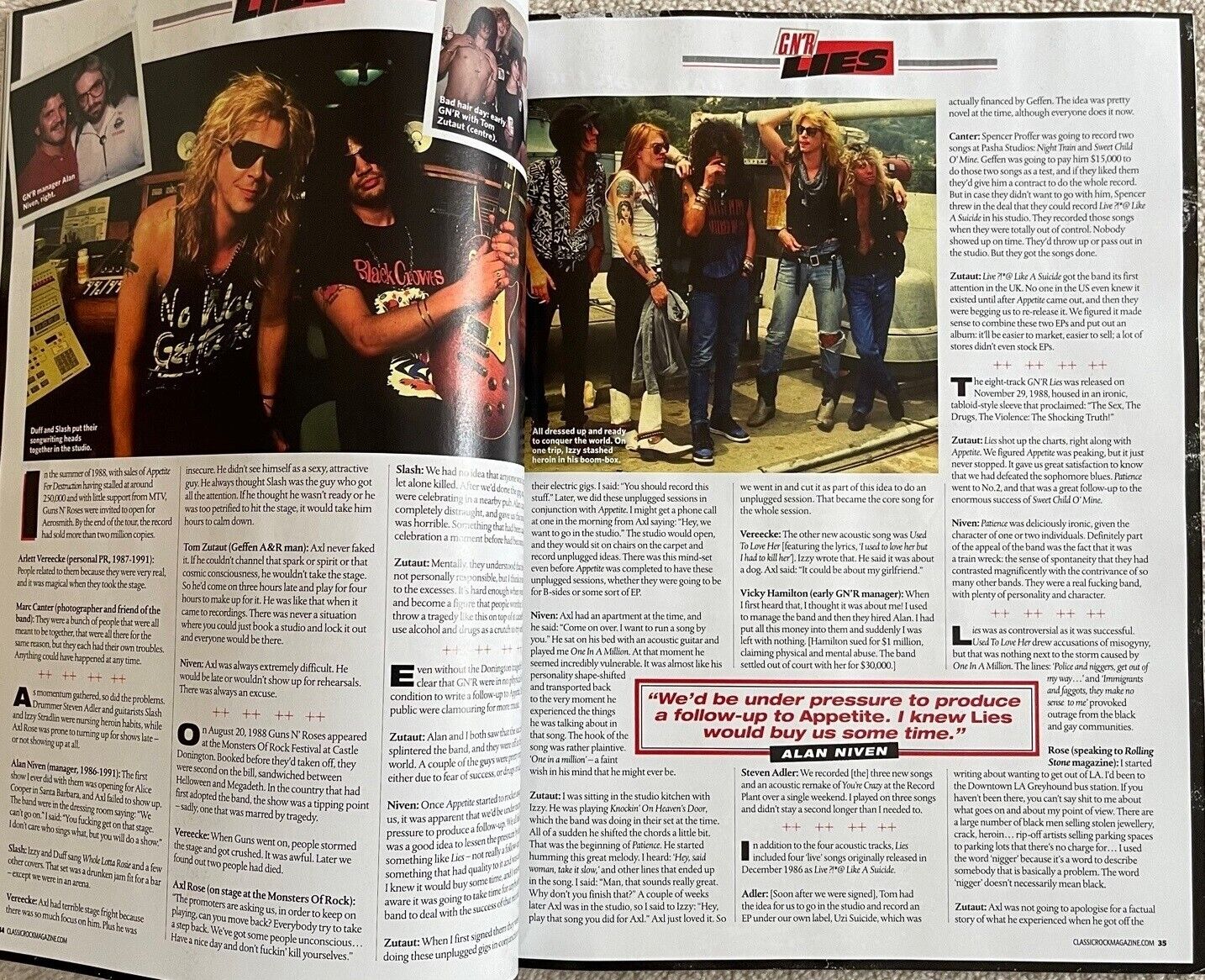
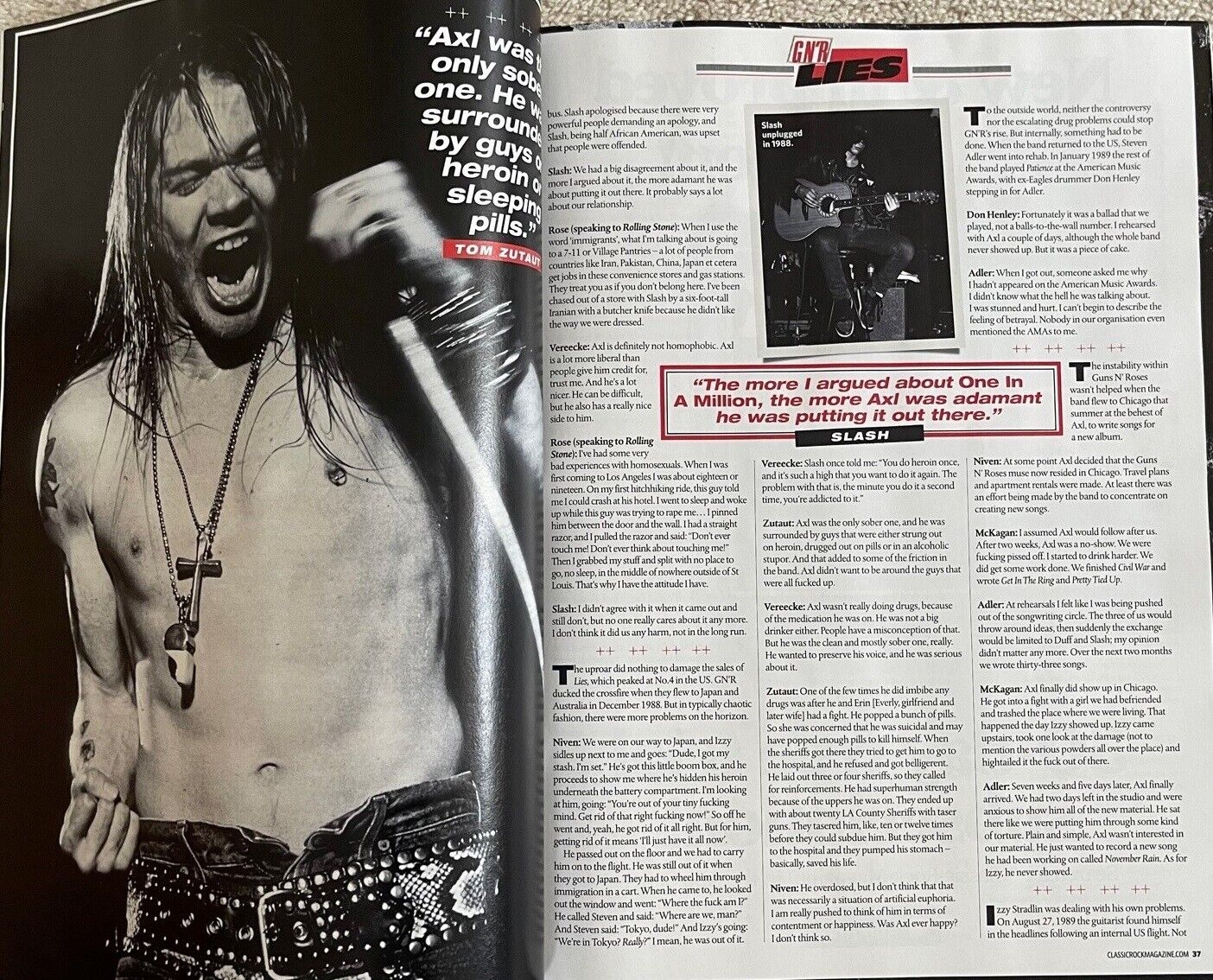
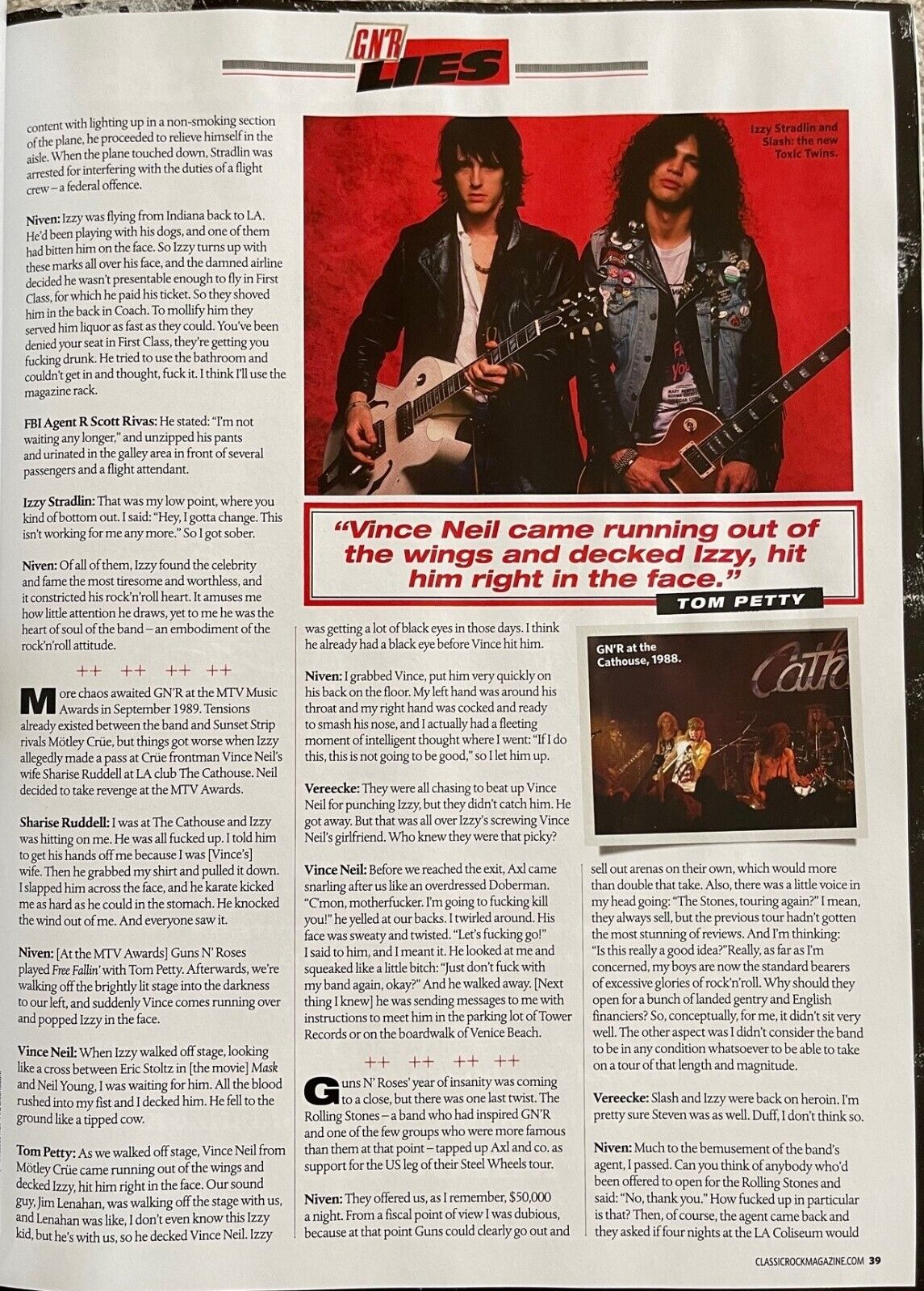
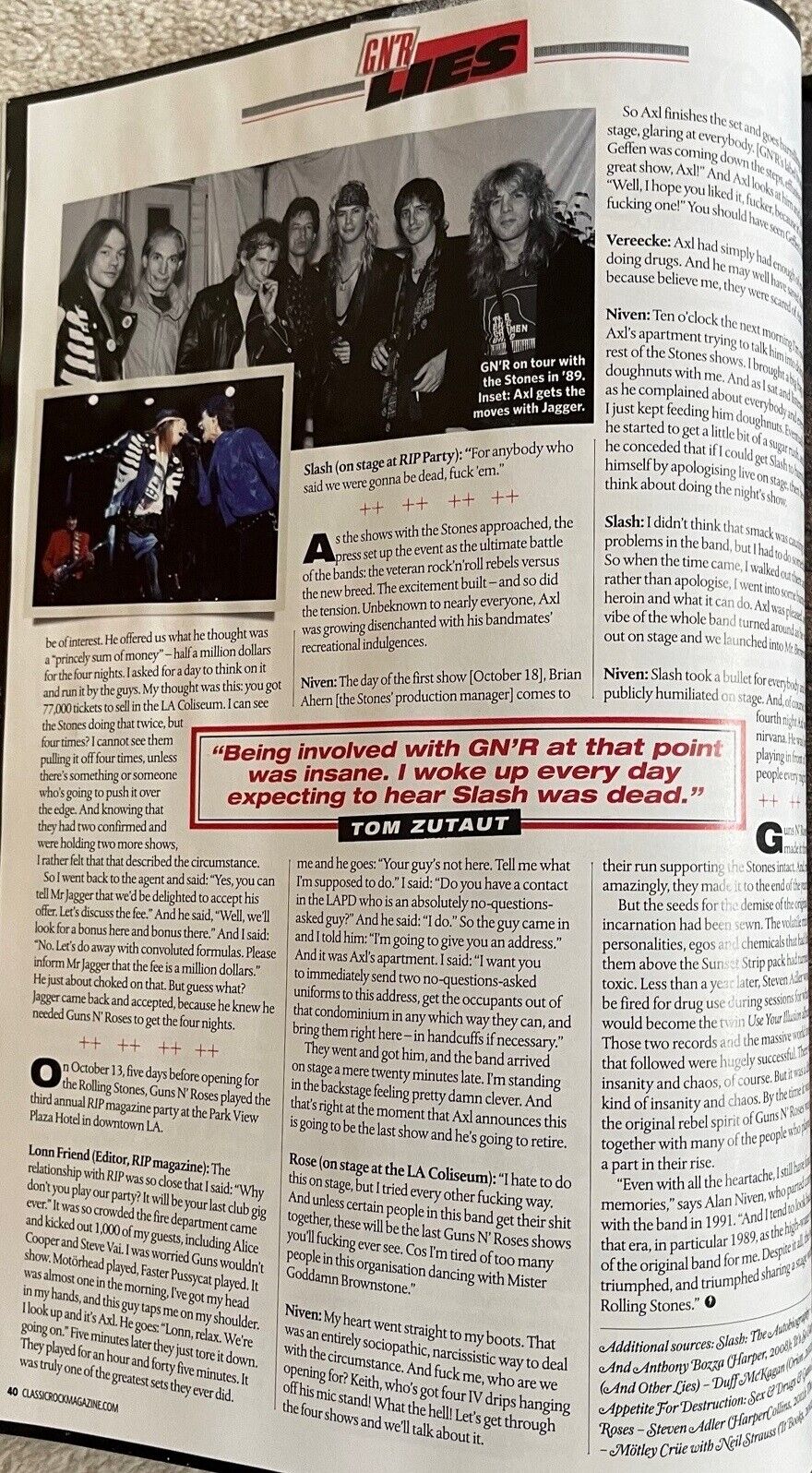
The Year Of Living Dangerously
If 1988 was when Guns N’ Roses became superstars, then 1989 saw them flying off the rails. From GN’R Lies to their meltdown with the Rolling Stones, this is the story of their dangerous year
By Jon Wierderhorn
From their earliest days as the brat-princes of Sunset Strip onwards, Guns N’ Roses thrived on chaos. The spark of volatility that coursed through their veins defined their music – never more so than on Appetite For Destruction, the feral debut album that would turn them from messy hopefuls into the biggest rock’n’roll band on the planet.
The all-encompassing success of Appetite masked the fact that it had been slow out of the blocks. Released in July 1987, it took 12 months for the album to properly break. Although when it finally did, in the summer of 1988, there was nothing and no one that could stop it.
But that was just the beginning of their fame and notoriety – and of their problems. The road to success was littered with insanity and carnage, but it had nothing on what would follow. With Appetite For Destruction an unstoppable tsunami, Guns N’ Roses were about to enter the craziest period of an already crazy career. Between the end of 1988 and the end of 1989 they’d become the most talked about, celebrated and controversial band around – all on the back of just one stopgap album and a handful of live appearances.
That this period would push them to the brink of extinction in the most public manner imaginable wasn’t the most surprising thing about those 12 months. The fact that they all made it out alive was. Not for nothing did GN’R start billing themselves as The World’s Most Dangerous Band. And it was a reputation they more than lived up to.
“Being involved with Guns N’ Roses at that point was insane,” says Tom Zutaut, the A&R man who signed the band to Geffen Records and remained at their side as their success escalated. “They were the biggest band in the world and they were out of control. That was extremely stressful. I woke up every day listening to the radio, fully expecting to hear that Slash was dead. But there are just certain bands that nothing can stop – no amount of alcohol, no amount of drugs. Guns were one of those.”
In the summer of 1988, with sales of Appetite For Destruction having stalled at around 250,000 and with little support from MTV, Guns N’ Roses were invited to open for Aerosmith. By the end of the tour, the record had sold more than two million copies.
Arlett Vereecke (personal PR, 1987-1991): People related to them because they were very real, and it was magical when they took the stage.
Marc Canter (photographer and friend of the band): They were a bunch of people that were all meant to be together, that were all there for the same reason, but they each had their own troubles. Anything could have happened at any time.
As momentum gathered, so did the problems. Drummer Steven Adler and guitarists Slash and Izzy Stradlin were nursing heroin habits, while Axl Rose was prone to turning up for shows late – or not showing up at all.
Alan Niven (manager, 1986-1991): The first show I ever did with them was opening for Alice Cooper in Santa Barbara, and Axl failed to show up. The band were in the dressing room saying: “We can’t go on.” I said: “You fucking get on that stage. I don’t care who sings what, but you will do a show.”
Slash: Izzy and Duff sang Whole Lotta Rosie and a few other covers. That set was a drunken jam fit for a bar – except we were in an arena.
Vereecke: Axl had terrible stage fright because there was so much focus on him. Plus he was insecure. He didn’t see himself as a sexy, attractive guy. He always thought Slash was the guy who got all the attention. If he thought he wasn’t ready or he was too petrified to hit the stage, it would take him hours to calm down.
Tom Zutaut (Geffen A&R man): Axl never faked it. If he couldn’t channel that spark or spirit or that cosmic consciousness, he wouldn’t take the stage. So he’d come on three hours late and play for four hours to make up for it. He was like that when it came to recordings. There was never a situation where you could just book a studio and lock it out and everyone would be there.
Niven: Axl was always extremely difficult. He would be late or wouldn’t show up for rehearsals. There was always an excuse.
On August 20, 1988 Guns N’ Roses appeared at the Monsters Of Rock Festival at Castle Donington. Booked before they’d taken off, they were second on the bill, sandwiched between Helloween and Megadeth. In the country that had first adopted the band, the show was a tipping point – sadly, one that was marred by tragedy.
Vereecke: When Guns went on, people stormed the stage and got crushed. It was awful. Later we found out two people had died.
Axl Rose (on stage at the Monsters Of Rock): “The promoters are asking us, in order to keep on playing, can you move back? Everybody try to take a step back. We’ve got some people unconscious… Have a nice day and don’t fuckin’ kill yourselves.”
Slash: We had no idea that anyone was hurt, let alone killed. After we’d done the gig and were celebrating in a nearby pub, Alan came in, completely distraught, and gave us the news. It was horrible. Something that had been cause for celebration a moment before had become a tragedy.
Zutaut: Mentally, they understood that they were not personally responsible, but I think it contributed to the excesses. It’s hard enough when you explode and become a figure that people worship. But to throw a tragedy like this on top of it caused them to use alcohol and drugs as a crutch to try and survive.
Even without the Donington tragedy, it was clear that GN’R were in no physical or mental condition to write a follow-up to Appetite. But the public were clamouring for more music.
Zutaut: Alan and I both saw that the success had splintered the band, and they were off in their own world. A couple of the guys were pretty remote, either due to fear of success, or drugs or alcohol.
Niven: Once Appetite started to rocket away from us, it was apparent that we’d be under incredible pressure to produce a follow-up. We all felt like it was a good idea to lessen the pressure by dropping something like Lies – not really a follow-up, but something that had quality to it and was a stopgap. I knew it would buy some time, and I was very aware it was going to take time for anybody in the band to deal with the success of that record.
Zutaut: When I first signed them they were doing these unplugged gigs in conjunction with their electric gigs. I said: “You should record this stuff.” Later, we did these unplugged sessions in conjunction with Appetite. I might get a phone call at one in the morning from Axl saying: “Hey, we want to go in the studio.” The studio would open, and they would sit on chairs on the carpet and record unplugged ideas. There was this mind-set even before Appetite was completed to have these unplugged sessions, whether they were going to be for B-sides or some sort of EP.
Niven: Axl had an apartment at the time, and he said: “Come on over. I want to run a song by you.” He sat on his bed with an acoustic guitar and played me One In A Million. At that moment he seemed incredibly vulnerable. It was almost like his personality shape-shifted and transported back to the very moment he experienced the things he was talking about in that song. The hook of the song was rather plaintive. ‘One in a million’ – a faint wish in his mind that he might ever be.
Zutaut: I was sitting in the studio kitchen with Izzy. He was playing Knockin’ On Heaven’s Door, which the band was doing in their set at the time. All of a sudden he shifted the chords a little bit. That was the beginning of Patience. He started humming this great melody. I heard: ‘Hey, said woman, take it slow,’ and other lines that ended up in the song. I said: “Man, that sounds really great. Why don’t you finish that?” A couple of weeks later Axl was in the studio, so I said to Izzy: “Hey, play that song you did for Axl.” Axl just loved it. So we went in and cut it as part of this idea to do an unplugged session. That became the core song for the whole session.
Vereecke: The other new acoustic song was Used To Love Her [featuring the lyrics, ‘I used to love her but I had to kill her’]. Izzy wrote that. He said it was about a dog. Axl said: “It could be about my girlfriend.” Vicky Hamilton (early GN’R manager): When I first heard that, I thought it was about me! I used to manage the band and then they hired Alan. I had put all this money into them and suddenly I was left with nothing. [Hamilton sued for $1 million, claiming physical and mental abuse. The band settled out of court with her for $30,000.]
Steven Adler: We recorded [the] three new songs and an acoustic remake of You’re Crazy at the Record Plant over a single weekend. I played on three songs and didn’t stay a second longer than I needed to.
In addition to the four acoustic tracks, Lies included four ‘live’ songs originally released in December 1986 as Live ?!*@ Like A Suicide.
Adler: [Soon after we were signed], Tom had the idea for us to go in the studio and record an EP under our own label, Uzi Suicide, which was actually financed by Geffen. The idea was pretty novel at the time, although everyone does it now.
Canter: Spencer Proffer was going to record two songs at Pasha Studios: Night Train and Sweet Child O’ Mine. Geffen was going to pay him $15,000 to do those two songs as a test, and if they liked them they’d give him a contract to do the whole record. But in case they didn’t want to go with him, Spencer threw in the deal that they could record Live ?!*@ Like A Suicide in his studio. They recorded those songs when they were totally out of control. Nobody showed up on time. They’d throw up or pass out in the studio. But they got the songs done.
Zutaut: Live ?!*@ Like A Suicide got the band its first attention in the UK. No one in the US even knew it existed until after Appetite came out, and then they were begging us to re-release it. We figured it made sense to combine these two EPs and put out an album: it’ll be easier to market, easier to sell; a lot of stores didn’t even stock EPs.
The eight-track GN’R Lies was released on November 29, 1988, housed in an ironic, tabloid-style sleeve that proclaimed: “The Sex, The Drugs, The Violence: The Shocking Truth!”
Zutaut: Lies shot up the charts, right along with Appetite. We figured Appetite was peaking, but it just never stopped. It gave us great satisfaction to know that we had defeated the sophomore blues. Patience went to No.2, and that was a great follow-up to the enormous success of Sweet Child O’ Mine.
Niven: Patience was deliciously ironic, given the character of one or two individuals. Definitely part of the appeal of the band was the fact that it was a train wreck: the sense of spontaneity that they had contrasted magnificently with the contrivance of so many other bands. They were a real fucking band, with plenty of personality and character.
Lies was as controversial as it was successful. Used To Love Her drew accusations of misogyny, but that was nothing next to the storm caused by One In A Million. The lines: ‘Police and niggers, get out of my way…’ and ‘Immigrants and faggots, they make no sense to me’ provoked outrage from the black and gay communities.
Rose (speaking to Rolling Stone magazine): I started writing about wanting to get out of LA. I’d been to the Downtown LA Greyhound bus station. If you haven’t been there, you can’t say shit to me about what goes on and about my point of view. There are a large number of black men selling stolen jewellery, crack, heroin… rip-off artists selling parking spaces to parking lots that there’s no charge for… I used the word ‘nigger’ because it’s a word to describe somebody that is basically a problem. The word ‘nigger’ doesn’t necessarily mean black.
Zutaut: Axl was not going to apologise for a factual story of what he experienced when he got off the bus. Slash apologised because there were very powerful people demanding an apology, and Slash, being half African American, was upset that people were offended.
Slash: We had a big disagreement about it, and the more I argued about it, the more adamant he was about putting it out there. It probably says a lot about our relationship.
Rose (speaking to Rolling Stone): When I use the word ‘immigrants’, what I’m talking about is going to a 7-11 or Village Pantries – a lot of people from countries like Iran, Pakistan, China, Japan et cetera get jobs in these convenience stores and gas stations. They treat you as if you don’t belong here. I’ve been chased out of a store with Slash by a six-foot-tall Iranian with a butcher knife because he didn’t like the way we were dressed.
Vereecke: Axl is definitely not homophobic. Axl is a lot more liberal than people give him credit for, trust me. And he’s a lot nicer. He can be difficult, but he also has a really nice side to him.
Rose (speaking to Rolling Stone): I’ve had some very bad experiences with homosexuals. When I was first coming to Los Angeles I was about eighteen or nineteen. On my first hitchhiking ride, this guy told me I could crash at his hotel. I went to sleep and woke up while this guy was trying to rape me… I pinned him between the door and the wall. I had a straight razor, and I pulled the razor and said: “Don’t ever touch me! Don’t ever think about touching me!” Then I grabbed my stuff and split with no place to go, no sleep, in the middle of nowhere outside of St Louis. That’s why I have the attitude I have.
Slash: I didn’t agree with it when it came out and still don’t, but no one really cares about it any more. I don’t think it did us any harm, not in the long run.
The uproar did nothing to damage the sales of Lies, which peaked at No.4 in the US. GN’R ducked the crossfire when they flew to Japan and Australia in December 1988. But in typically chaotic fashion, there were more problems on the horizon.
Niven: We were on our way to Japan, and Izzy sidles up next to me and goes: “Dude, I got my stash. I’m set.” He’s got this little boom box, and he proceeds to show me where he’s hidden his heroin underneath the battery compartment. I’m looking at him, going: “You’re out of your tiny fucking mind. Get rid of that right fucking now!” So off he went and, yeah, he got rid of it all right. But for him, getting rid of it means ‘I’ll just have it all now’. He passed out on the floor and we had to carry him on to the flight. He was still out of it when they got to Japan. They had to wheel him through immigration in a cart. When he came to, he looked out the window and went: “Where the fuck am I?” He called Steven and said: “Where are we, man?” And Steven said: “Tokyo, dude!” And Izzy’s going: “We’re in Tokyo? Really?” I mean, he was out of it.
Vereecke: Slash once told me: “You do heroin once, and it’s such a high that you want to do it again. The problem with that is, the minute you do it a second time, you’re addicted to it.”
Zutaut: Axl was the only sober one, and he was surrounded by guys that were either strung out on heroin, drugged out on pills or in an alcoholic stupor. And that added to some of the friction in the band. Axl didn’t want to be around the guys that were all fucked up.
Vereecke: Axl wasn’t really doing drugs, because of the medication he was on. He was not a big drinker either. People have a misconception of that. But he was the clean and mostly sober one, really. He wanted to preserve his voice, and he was serious about it.
Zutaut: One of the few times he did imbibe any drugs was after he and Erin [Everly, girlfriend and later wife] had a fight. He popped a bunch of pills. So she was concerned that he was suicidal and may have popped enough pills to kill himself. When the sheriffs got there they tried to get him to go to the hospital, and he refused and got belligerent. He laid out three or four sheriffs, so they called for reinforcements. He had superhuman strength because of the uppers he was on. They ended up with about twenty LA County Sheriffs with taser guns. They tasered him, like, ten or twelve times before they could subdue him. But they got him to the hospital and they pumped his stomach – basically, saved his life.
Niven: He overdosed, but I don’t think that that was necessarily a situation of artificial euphoria. I am really pushed to think of him in terms of contentment or happiness. Was Axl ever happy? I don’t think so.
To the outside world, neither the controversy nor the escalating drug problems could stop GN’R’s rise. But internally, something had to be done. When the band returned to the US, Steven Adler went into rehab. In January 1989 the rest of the band played Patience at the American Music Awards, with ex-Eagles drummer Don Henley stepping in for Adler.
Don Henley: Fortunately it was a ballad that we played, not a balls-to-the-wall number. I rehearsed with Axl a couple of days, although the whole band never showed up. But it was a piece of cake.
Adler: When I got out, someone asked me why I hadn’t appeared on the American Music Awards. I didn’t know what the hell he was talking about. I was stunned and hurt. I can’t begin to describe the feeling of betrayal. Nobody in our organisation even mentioned the AMAs to me. The instability within Guns N’ Roses wasn’t helped when the band flew to Chicago that summer at the behest of Axl, to write songs for a new album.
Niven: At some point Axl decided that the Guns N’ Roses muse now resided in Chicago. Travel plans and apartment rentals were made. At least there was an effort being made by the band to concentrate on creating new songs.
McKagan: I assumed Axl would follow after us. After two weeks, Axl was a no-show. We were fucking pissed off. I started to drink harder. We did get some work done. We finished Civil War and wrote Get In The Ring and Pretty Tied Up.
Adler: At rehearsals I felt like I was being pushed out of the songwriting circle. The three of us would throw around ideas, then suddenly the exchange would be limited to Duff and Slash; my opinion didn’t matter any more. Over the next two months we wrote thirty-three songs.
McKagan: Axl finally did show up in Chicago. He got into a fight with a girl we had befriended and trashed the place where we were living. That happened the day Izzy showed up. Izzy came upstairs, took one look at the damage (not to mention the various powders all over the place) and hightailed it the fuck out of there.
Adler: Seven weeks and five days later, Axl finally arrived. We had two days left in the studio and were anxious to show him all of the new material. He sat there like we were putting him through some kind of torture. Plain and simple, Axl wasn’t interested in our material. He just wanted to record a new song he had been working on called November Rain. As for Izzy, he never showed.
Izzy Stradlin was dealing with his own problems. On August 27, 1989 the guitarist found himself in the headlines following an internal US flight. Not content with lighting up in a non-smoking section of the plane, he proceeded to relieve himself in the aisle. When the plane touched down, Stradlin was arrested for interfering with the duties of a flight crew – a federal offence.
Niven: Izzy was flying from Indiana back to LA. He’d been playing with his dogs, and one of them had bitten him on the face. So Izzy turns up with these marks all over his face, and the damned airline decided he wasn’t presentable enough to fly in First Class, for which he paid his ticket. So they shoved him in the back in Coach. To mollify him they served him liquor as fast as they could. You’ve been denied your seat in First Class, they’re getting you fucking drunk. He tried to use the bathroom and couldn’t get in and thought, fuck it. I think I’ll use the magazine rack.
FBI Agent R Scott Rivas: He stated: “I’m not waiting any longer,” and unzipped his pants and urinated in the galley area in front of several passengers and a flight attendant.
Izzy Stradlin: That was my low point, where you kind of bottom out. I said: “Hey, I gotta change. This isn’t working for me any more.” So I got sober.
Niven: Of all of them, Izzy found the celebrity and fame the most tiresome and worthless, and it constricted his rock’n’roll heart. It amuses me how little attention he draws, yet to me he was the heart of soul of the band – an embodiment of the rock’n’roll attitude.
Guns N’ Roses’ year of insanity was coming to a close, but there was one last twist. The Rolling Stones – a band who had inspired GN’R and one of the few groups who were more famous than them at that point – tapped up Axl and co. as support for the US leg of their Steel Wheels tour.
Niven: They offered us, as I remember, $50,000 a night. From a fiscal point of view I was dubious, because at that point Guns could clearly go out and sell out arenas on their own, which would more than double that take. Also, there was a little voice in my head going: “The Stones, touring again?” I mean, they always sell, but the previous tour hadn’t gotten the most stunning of reviews. And I’m thinking: “Is this really a good idea?”Really, as far as I’m concerned, my boys are now the standard bearers of excessive glories of rock’n’roll. Why should they open for a bunch of landed gentry and English financiers? So, conceptually, for me, it didn’t sit very well. The other aspect was I didn’t consider the band to be in any condition whatsoever to be able to take on a tour of that length and magnitude.
Vereecke: Slash and Izzy were back on heroin. I’m pretty sure Steven was as well. Duff, I don’t think so.
Niven: Much to the bemusement of the band’s agent, I passed. Can you think of anybody who’d been offered to open for the Rolling Stones and said: “No, thank you.” How fucked up in particular is that? Then, of course, the agent came back and they asked if four nights at the LA Coliseum would be of interest. He offered us what he thought was a “princely sum of money” – half a million dollars for the four nights. I asked for a day to think on it and run it by the guys. My thought was this: you got 77,000 tickets to sell in the LA Coliseum. I can see the Stones doing that twice, but four times? I cannot see them pulling it off four times, unless there’s something or someone who’s going to push it over the edge. And knowing that they had two confirmed and were holding two more shows, I rather felt that that described the circumstance. So I went back to the agent and said: “Yes, you can tell Mr Jagger that we’d be delighted to accept his offer. Let’s discuss the fee.” And he said, “Well, we’ll look for a bonus here and bonus there.” And I said: “No. Let’s do away with convoluted formulas. Please inform Mr Jagger that the fee is a million dollars.” He just about choked on that. But guess what? Jagger came back and accepted, because he knew he needed Guns N’ Roses to get the four nights.
On October 13, five days before opening for the Rolling Stones, Guns N’ Roses played the third annual RIP magazine party at the Park View Plaza Hotel in downtown LA.
Lonn Friend (Editor, RIP magazine): The relationship with RIP was so close that I said: “Why don’t you play our party? It will be your last club gig ever.” It was so crowded the fire department came and kicked out 1,000 of my guests, including Alice Cooper and Steve Vai. I was worried Guns wouldn’t show. Motörhead played, Faster Pussycat played. It was almost one in the morning, I’ve got my head in my hands, and this guy taps me on my shoulder. I look up and it’s Axl. He goes: “Lonn, relax. We’re going on.” Five minutes later they just tore it down. They played for an hour and forty five minutes. It was truly one of the greatest sets they ever did.
Slash (on stage at RIP Party): “For anybody who said we were gonna be dead, fuck ’em.”
As the shows with the Stones approached, the press set up the event as the ultimate battle of the bands: the veteran rock’n’roll rebels versus the new breed. The excitement built – and so did the tension. Unbeknown to nearly everyone, Axl was growing disenchanted with his bandmates’ recreational indulgences.
Niven: The day of the first show [October 18], Brian Ahern [the Stones’ production manager] comes to me and he goes: “Your guy’s not here. Tell me what I’m supposed to do.” I said: “Do you have a contact in the LAPD who is an absolutely no-questions asked guy?” And he said: “I do.” So the guy came in and I told him: “I’m going to give you an address.” And it was Axl’s apartment. I said: “I want you to immediately send two no-questions-asked uniforms to this address, get the occupants out of that condominium in any which way they can, and bring them right here – in handcuffs if necessary.” They went and got him, and the band arrived on stage a mere twenty minutes late. I’m standing in the backstage feeling pretty damn clever. And that’s right at the moment that Axl announces this is going to be the last show and he’s going to retire.
Rose (on stage at the LA Coliseum): “I hate to do this on stage, but I tried every other fucking way. And unless certain people in this band get their shit together, these will be the last Guns N’ Roses shows you’ll fucking ever see. Cos I’m tired of too many people in this organisation dancing with Mister Goddamn Brownstone.”
Niven: My heart went straight to my boots. That was an entirely sociopathic, narcissistic way to deal with the circumstance. And fuck me, who are we opening for? Keith, who’s got four IV drips hanging off his mic stand! What the hell! Let’s get through the four shows and we’ll talk about it. So Axl finishes the set and goes barrelling off the stage, glaring at everybody. [GN’R’s label boss] David Geffen was coming down the steps, effusive: “Oh, great show, Axl!” And Axl looks at him and goes: “Well, I hope you liked it, fucker, because it’s the last fucking one!” You should have seen Geffen’s face.
Vereecke: Axl had simply had enough of everyone doing drugs. And he may well have saved their lives, because believe me, they were scared of Axl.
Niven: Ten o’clock the next morning I’m over at Axl’s apartment trying to talk him into doing the rest of the Stones shows. I brought a big bag of doughnuts with me. And as I sat and listened and as he complained about everybody and everything, I just kept feeding him doughnuts. Eventually he started to get a little bit of a sugar rush, and he conceded that if I could get Slash to humiliate himself by apologising live on stage, then he might think about doing the night’s show.
Slash: I didn’t think that smack was causing the problems in the band, but I had to do something. So when the time came, I walked out there and, rather than apologise, I went into some banter about heroin and what it can do. Axl was pleased, and the vibe of the whole band turned around as he walked out on stage and we launched into Mr. Brownstone.
Niven: Slash took a bullet for everybody and was publicly humiliated on stage. And, of course, by the fourth night Axl was in nirvana. He was loving playing in front of 77,000 people every night.
Guns N’ Roses made it through their run supporting the Stones intact. And, more amazingly, they made it to the end of the year alive. But the seeds for the demise of the original incarnation had been sewn. The volatile mix of personalities, egos and chemicals that had lifted them above the Sunset Strip pack had turned toxic. Less than a year later, Steven Adler would be fired for drug use during sessions for what would become the twin Use Your Illusion albums. Those two records and the massive world tour that followed were hugely successful. There was insanity and chaos, of course. But it was a different kind of insanity and chaos. By the time it was done, the original rebel spirit of Guns N’ Roses was gone, together with many of the people who played a part in their rise.
“Even with all the heartache, I still have fond memories,” says Alan Niven, who parted company with the band in 1991. “And I tend to look back at that era, in particular 1989, as the high-water mark of the original band for me. Despite it all, the band triumphed, and triumphed sharing a stage with the Rolling Stones.”
Additional sources: Slash: The Autobiography – Slash And Anthony Bozza (Harper, 2008); It’s So Easy (And Other Lies) – Duff McKagan (Orion ,2012); My Appetite For Destruction: Sex & Drugs & Guns N’ Roses – Steven Adler (HarperCollins, 2011); The Dirt – Mötley Crüe with Neil Strauss (It Books, 2002).
https://www.loudersound.com/features/fistfights-meltdowns-gnr-lies-12-months-that-nearly-killed-guns-n-roses

Blackstar- ADMIN
- Posts : 13902
Plectra : 91332
Reputation : 101
Join date : 2018-03-17
 Re: 2014.07.DD - Classic Rock - The Year Of Living Dangerously (The Story Of GN'R Lies)
Re: 2014.07.DD - Classic Rock - The Year Of Living Dangerously (The Story Of GN'R Lies)
The article is actually from the July 2014 issue of Classic Rock. I have edited the title and added the images.
Most of the quotes from Slash, as well as the quotes from Steven and Duff, are from their autobiographies.
Most of the quotes from Slash, as well as the quotes from Steven and Duff, are from their autobiographies.

Blackstar- ADMIN
- Posts : 13902
Plectra : 91332
Reputation : 101
Join date : 2018-03-17
Soulmonster likes this post
 Similar topics
Similar topics» 2010.09.26 - Classic Rock Revisited - Slash: Dangerously Beautiful
» 2014.07.29 - Classic Rock - Slash Congratulates Classic Rock Magazine
» 2009.03.DD - Classic Rock - GN'R Lies (Alan Niven)
» 2010.06.DD - Classic Rock - The Story Behind The Shot (Gene Kirkland)
» 2016.02.19 - Classic Rock - Guns N' Roses: The Real Story Behind Their Return
» 2014.07.29 - Classic Rock - Slash Congratulates Classic Rock Magazine
» 2009.03.DD - Classic Rock - GN'R Lies (Alan Niven)
» 2010.06.DD - Classic Rock - The Story Behind The Shot (Gene Kirkland)
» 2016.02.19 - Classic Rock - Guns N' Roses: The Real Story Behind Their Return
Page 1 of 1
Permissions in this forum:
You cannot reply to topics in this forum
